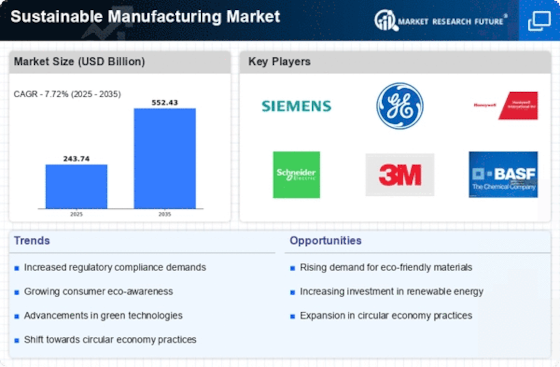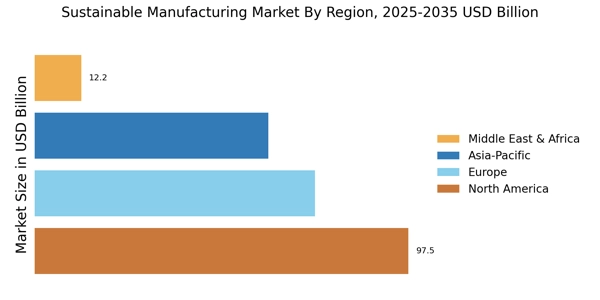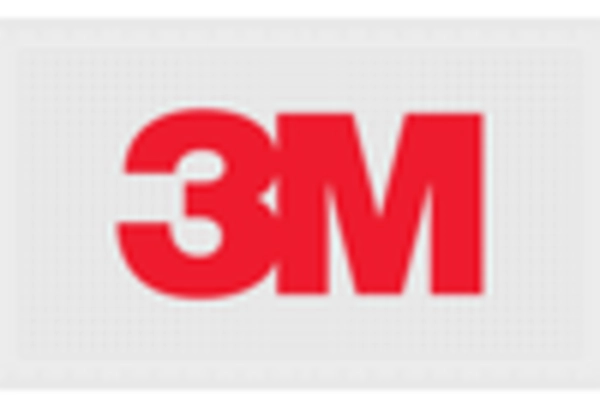Investment in Sustainable Supply Chains
The Sustainable Manufacturing Market is witnessing a growing emphasis on sustainable supply chain management. Companies are increasingly recognizing that sustainability extends beyond their own operations and into their supply chains. Investments in sustainable sourcing, transportation, and logistics are becoming essential for manufacturers aiming to enhance their overall sustainability profile. Research indicates that companies with sustainable supply chains can reduce operational costs by up to 20% while improving their environmental impact. This trend suggests that manufacturers who prioritize sustainability throughout their supply chains may achieve both economic and ecological benefits, thereby strengthening their position in the Sustainable Manufacturing Market.
Corporate Social Responsibility Initiatives
The Sustainable Manufacturing Market is increasingly shaped by corporate social responsibility (CSR) initiatives. Companies are recognizing the importance of integrating sustainability into their core business strategies, not only to meet regulatory requirements but also to enhance their brand reputation. A significant number of manufacturers are now committing to sustainability goals, such as achieving net-zero emissions or utilizing 100% renewable energy. These initiatives resonate with consumers and investors alike, as they reflect a commitment to ethical practices. As CSR becomes a central tenet of business strategy, manufacturers that effectively communicate their sustainability efforts may attract a more loyal customer base and potentially increase their market share in the Sustainable Manufacturing Market.
Growing Consumer Demand for Sustainable Products
The Sustainable Manufacturing Market is experiencing a notable shift in consumer preferences, with an increasing number of individuals prioritizing sustainability in their purchasing decisions. Recent surveys indicate that approximately 70% of consumers are willing to pay a premium for products that are environmentally friendly. This trend is compelling manufacturers to adopt sustainable practices, as they seek to align their offerings with consumer values. The rise in eco-consciousness is not merely a passing trend; it appears to be a fundamental change in consumer behavior that is likely to persist. As a result, companies that embrace sustainable manufacturing practices may gain a competitive edge, potentially leading to increased market share and customer loyalty.
Increased Regulatory Pressure for Sustainability
The Sustainable Manufacturing Market is under heightened scrutiny due to evolving regulations aimed at promoting sustainability. Governments are implementing stricter environmental standards and policies that require manufacturers to reduce their carbon footprints and improve waste management practices. For example, regulations mandating reductions in greenhouse gas emissions are becoming more prevalent, compelling companies to adopt sustainable manufacturing processes. This regulatory pressure is not merely a challenge; it also presents opportunities for innovation and leadership in sustainability. Companies that proactively comply with these regulations may not only avoid penalties but also position themselves as leaders in the Sustainable Manufacturing Market.
Technological Advancements in Manufacturing Processes
The Sustainable Manufacturing Market is significantly influenced by advancements in technology that facilitate more efficient and environmentally friendly production methods. Innovations such as automation, artificial intelligence, and the Internet of Things are enabling manufacturers to optimize resource use and minimize waste. For instance, the implementation of smart manufacturing technologies can lead to a reduction in energy consumption by up to 30%. These technological improvements not only enhance productivity but also contribute to sustainability goals. As manufacturers increasingly adopt these technologies, the industry is likely to witness a transformation that aligns economic growth with environmental stewardship.
















